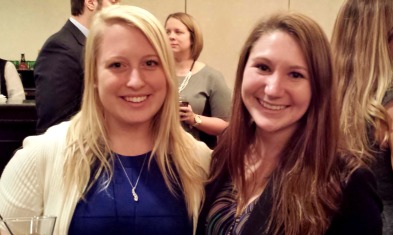Recently, I attended the 100th National Communication Association Convention in Chicago with 3 fellow students (pictured) in order to expand my understanding of where I could go and what I could do with a communication degree. So far I only knew that I enjoyed studying things on a global scale and that I was interested in health and political topics. I went to numerous panels, fairs, and receptions over the course of the convention in the hopes of gaining some insight for what my future could look like. Little did I know, going to this convention let me grow in academic and personal ways.

For starters, my favorite events were the panels. They were organized by topic and then 3 or 4 distinguished communication professionals would showcase their work for the topic and answer questions. It was essentially an academic version of speed dating – intro, information, questions, then on to the next person! The panel that resonated with me most was the “Future of Health, Risk, and Crisis Communication”, which is where I met Dr. Chan Thai from the National Cancer Institute. Her objective for research is incorporating theoretical perspectives into objective-based research; in other words, academia into real-world application. I found this interesting since I want to work in a government or private sector organization. When I told her that, she said to “research everything, but always have an application in mind. Constantly be asking ‘What’s next?’ of your research to make sure it can have impact. A positive outcome from research is one of the most effective ways people can change society, especially in health related circumstances.” Her advice is incredibly valuable and I expect to focus on how my research projects can be used in society from now on.
Second, the graduate school fair was amazing! I immediately gravitated towards the University of Kentucky for its Crisis and Risk Communication focus. (Just to say – I went to the other tables, too!) There I became interested in working with governmental organizations – something UKY does often. I immediately asked the representatives at the booth of which faculty members were at the conference and where I could find them. Little by little, I worked on making connections.
By the end of my conference, I was exhausted. I was, however, determined to meet Dr. Shari Veil from UKY. After attending Ohio University’s reception party, I went to the Kentucky’s. I cannot stress the importance of confidence enough during events like these! Even though I was shaking and genuinely stressing out in my head, introducing myself to Dr. Veil went a long way! She was excited to meet someone interested in the university and introduced me to everyone – from faculty member, Dr. Spence, to current graduate student, Marjorie Buckner. When I asked Dr. Spence about what makes a good communication student, he told me to “build on every piece of work you write. Make sure that it’s a continuation of research and that the topics are related – not random and scattered. That’ll set you up for major projects and will make you more knowledgeable.” Every person I met gave amazing advice and were all very welcoming. This experience proves what I’ve been told my whole life – A little bit of confidence goes a long way! After all, I wouldn’t have even made it to the reception if I was too shy. By the end of the night, I had handed countless people my business card. I honestly couldn’t believe how quickly I had made those connections – it was a true “networking” experience.
I have gained an entirely new mindset from this conference. If you are a communication scholar – You need to go! All of the advice I heard (from professionals, faculty, and students) about the communication field and how to excel in doing what you love, while still maintaining humanity and emotions, is priceless. With them and this convention, I am a better prepared scholar and a more holistic person. They truly had an impact on where I think I’d like to go with my degree and what I can do with my research to have a positive impact on society.
How did you find your passion? What made you decide your career path? How can communication research apply to you?
